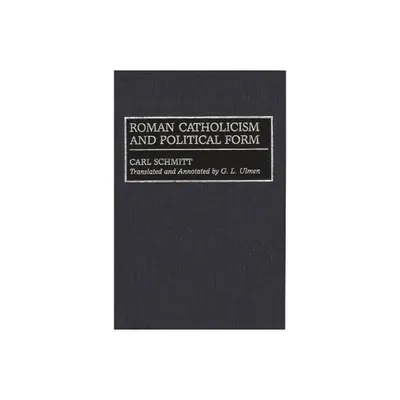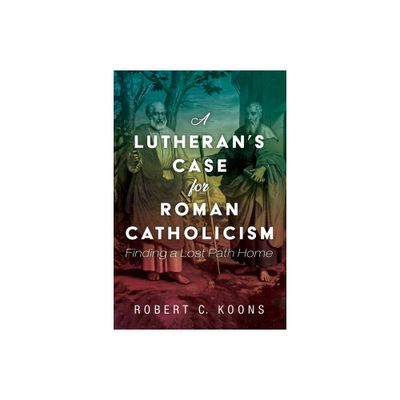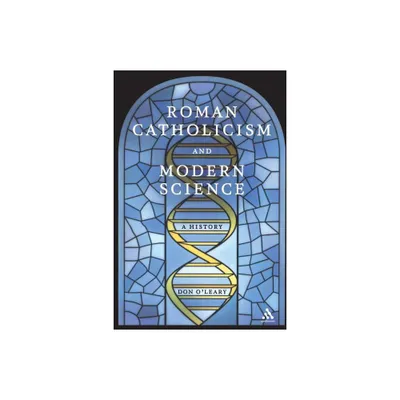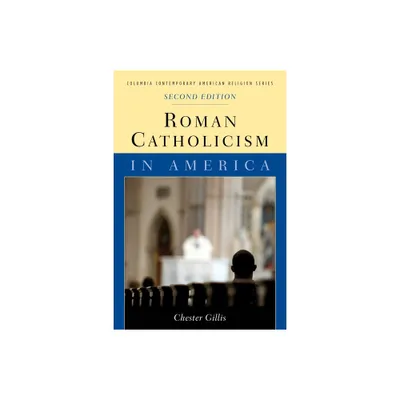Home
Roman Catholicism and Political Form
Loading Inventory...
Barnes and Noble
Roman Catholicism and Political Form
Current price: $110.00


Barnes and Noble
Roman Catholicism and Political Form
Current price: $110.00
Loading Inventory...
Size: OS
*Product Information may vary - to confirm product availability, pricing, and additional information please contact Barnes and Noble
The relationship between economic and political thinking has reached a crisis at the end of the 20th century. Already at the beginning of this century, in
Roman Catholicism and Political Form
, Carl Schmitt juxtaposed a juridical interpretation of religion oriented to the political sphere to Max Weber's sociological interpretation oriented to the economic sphere in
The Protestant Ethic and the Spirit of Capitalism
.
According to G. L. Ulmen, translator of
, this book is important not only for its content, even more relevant at the end than at the beginning of this century, but also for its author, one of the 20th century's most seminal thinkers. While exploring and elaborating the meaning of political theology in Germany in the 1920s, Carl Schmitt had occasion to address the question of the relation between Roman Catholicism and the moderneven post-modernworld. As Schmitt saw it, the state, as the principal agent of secularization and the supreme accomplishment of occidental rationalism, was the core institution of the modern world, which lasted from the 16th to the end of the 19th century, when the assumptions and concepts of the
jus publicum Europaeum
and the Eurocentric epoch of world history began to decline.
Asserting that all significant concepts of the modern theory of the state are secularized theological concepts, Schmitt felt the need to address the question of what political form might replace the state. It was in this context that he wrote
, which presupposes an affinity not only between the Church and the state, but between Catholicism and political thinking. Once the state began to lose its monopoly of politics and, thereby, its legitimacy, Schmitt looked to the other side of the occidental equationthe Catholic Churchin search of a new form of the political. His argument proceeds from the assumption that there is a structural identity between the metaphysical image of the world a particular age creates and the form of a political organization.
Roman Catholicism and Political Form
, Carl Schmitt juxtaposed a juridical interpretation of religion oriented to the political sphere to Max Weber's sociological interpretation oriented to the economic sphere in
The Protestant Ethic and the Spirit of Capitalism
.
According to G. L. Ulmen, translator of
, this book is important not only for its content, even more relevant at the end than at the beginning of this century, but also for its author, one of the 20th century's most seminal thinkers. While exploring and elaborating the meaning of political theology in Germany in the 1920s, Carl Schmitt had occasion to address the question of the relation between Roman Catholicism and the moderneven post-modernworld. As Schmitt saw it, the state, as the principal agent of secularization and the supreme accomplishment of occidental rationalism, was the core institution of the modern world, which lasted from the 16th to the end of the 19th century, when the assumptions and concepts of the
jus publicum Europaeum
and the Eurocentric epoch of world history began to decline.
Asserting that all significant concepts of the modern theory of the state are secularized theological concepts, Schmitt felt the need to address the question of what political form might replace the state. It was in this context that he wrote
, which presupposes an affinity not only between the Church and the state, but between Catholicism and political thinking. Once the state began to lose its monopoly of politics and, thereby, its legitimacy, Schmitt looked to the other side of the occidental equationthe Catholic Churchin search of a new form of the political. His argument proceeds from the assumption that there is a structural identity between the metaphysical image of the world a particular age creates and the form of a political organization.


















